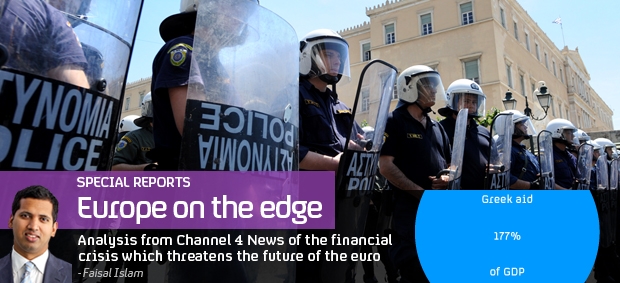Cameron and Merkel in eurozone crisis talks
Prime Minister David Cameron pledges that he will not ask British taxpayers to underwrite the debts of ailing banks in Greece and Spain.
David Cameron has described his meeting about the crisis in the eurozone with German Chancellor Angela Merkel in Berlin as “good and positive”.
Before the meeting the prime minister put his weight behind proposals for closer fiscal union between the 17 eurozone nations – perhaps by the issue of “eurobonds”.
But he left no doubt that Britain would not be involved in any such arrangement.
Mr Cameron said: “I can understand why eurozone countries may want to look at elements of banking union. Because we are not in the single currency, we won’t take part in the profound elements of that banking union.
“I wouldn’t ask British taxpayers to stand behind the Greek or Spanish deposits. It is not our currency, so that would be inappropriate to do.”
‘Deeper integration’
“I understand why single currency countries have to look at deeper integration. I will make sure that Britain’s interests, particularly in the single market and the openness and fairness of the single market are protected. That is key for Britain.”
“We want the eurozone to succeed. We want the euro to solve the problems it faces, so that all European economies including ours can get back to healthy growth.”
Spain's cajas, Banking Union and British EU exit - read Faisal Islam's blog
Mr Cameron who has also warned against holding Germany solely responsible for delays in dealing with the eurozone crisis, said Britain wanted the Eurozone to succeed.
He had been expected to press Germany for speedy action to deal with the crisis in the eurozone.
Ms Merkel is coming under growing pressure to put German taxpayers’ money behind measures such as eurobonds which would spread the burden of debt from ailing economies like Greece among the 17 single currency members.
He was expected to tell her that he and US president Barack Obama are agreed that an “immediate plan” is needed to save the eurozone. Last night he warned that “speed is of the essence” if jobs, opportunities and growth are not to be lost
“I don’t think it’s right to try to lay all the responsibility on one person. It is everyone in the eurozone and throughout the EU,” said Mr Cameron, during a visit to Norway last night. “We all need to do the right things to help ease this crisis.
With the re-run Greek election on 17 June followed by crucial summits of the G20 in Mexico and the European Council in Brussels, pressure is on for concrete action by the end of this month.
‘Decisive’ action
Mr Cameron has been calling for some months for “decisive” action from eurozone members to stand behind their currency and he will be bolstered in today’s talks by the outcome of Tuesday’s phone call with Mr Obama.
Downing Street said that the prime minister and US president “agreed on the need for an immediate plan to tackle the crisis and to restore market confidence, as well as a longer-term strategy to secure a strong single currency”.
In a key speech in Manchester last month, Mr Cameron threw his weight behind the eurobond proposal, saying: “The eurozone needs to put in place governance arrangements that create confidence for the future.
“And as the British government has been arguing for a year now, that means following the logic of monetary union towards solutions that deliver greater forms of collective support and collective responsibility, of which eurobonds are one possible example.
“Steps such as these are needed to put an end to speculation about the future of the euro.”
But Ms Merkel has indicated that it would be wrong to establish eurobonds unless they are accompanied with closer fiscal union between eurozone states.
She said at the weekend: “You can’t demand eurobonds but not be prepared for the next step in European integration. We won’t be able to create a successful currency like that and no-one outside will lend us money any more.”
-
Latest news
-
‘Russian aggressions have never pushed Georgia to deviate from its own path’, says Georgian President5m

-
Why is Georgia’s ruling party so intent on adopting ‘foreign influence’ bill?5m

-
Trump’s lawyers try to paint Michael Cohen as liar out for revenge at trial3m

-
England’s schools told not teach gender identity2m

-
Slovakia PM shooting: Suspect charged with attempted murder3m

-





